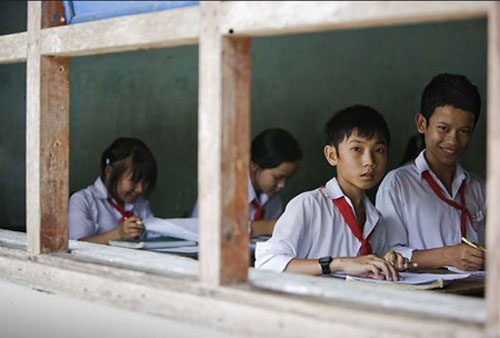Scholarships give poor students chance to learn
A 10-year-old scheme to reduce the number of poor students dropping out before graduation has worked so effectively in the central region and it is likely to be expanded to other provinces.
The programme, titled Scholarship Programme to Enhance Literacy and Learning (SPELL), enhances the quality of study in the provinces of Quang Binh, Thua Thien-Hue, Da Nang, Quang Ngai, Binh Dinh, and Phu Yen.
"It is a long-term and sustainable programme," said Hoang Ngoc Tung, the programme manager.
"It is effective in reducing the percentage of drop-out students as well as increasing number of excellent students."
The programme has been used at 205 schools to assist poor students who have good study records and are nominated by teachers as having a strong desire for higher education.
 |
| Students at a SPELL programme class. — Photo courtesy of East Meets West |
In Thua Thien-Hue, Luong Thi An Quyen receives a scholarship from the programme.
Her father is a xe om driver (motorbike taxi) and her mother is an amateur embroiderer. However, their combined incomes are insufficient to look after and educate three children.
"I had to borrow old books from my cousin to study and I did not have a chance to take extra classes even though I desperately wanted to, until SPELL found me in 2010," she said.
According to Quyen, her teachers nominated her for the programme when she was in Grade 8 at Le Hong Phong Secondary School. Since then, she has received a scholarship each year that cover her need for books, tuition, extra classes - and a precious bicycle.
Quyen said the scholarship had enabled her to join a class for talented students at Quoc Hoc High School, where she is in Grade 12. She now has the determination to sit for university entrance exams next year.
Each year at high school, Quyen received about US$600 from SPELL. Her pay-back is to continue to make excellent progress, because low grades means less scholarship money.
In Quang Nam Province, Le Thi Kim Hoang is an example of the programme's success. Hoang was one of the first students taken in 2004 and the scholarship is still supporting her.
Hoang was an exellent student at secondary school in the province's mountainous Nong Son district and is now attending the English Faculty at Da Nang Univeristy of Foreign Languages.
Hoang receives US$700 a year, which enables her to rent a room and pay for tuition, including short-term courses.
Hoang, a confident third-year student, said the scholarship was fundamental to her life. "It gives me great confidence to go forward in study," she said. Her mother's humble income is only enough to subsidise her elder sister's tertiary education.
According to programme manager Tung, in its 10 years, the programme has assisted 2,763 students in secondary and high schools, and universities, with a total scholarship of $4.4 million.
The programme is credited with an 85 per cent reduction in drop-outs at most schools where it has been applied.
The proportion of students who completed high school under the programme also increased to 97 per cent. Many poor students have also succeeded entering schools for the gifted, Tung said.
For years, the fact that many poor students were dropping out to undertake vocational training as carpenters, builders, tailors, mechanics or welders has bothered educators.
"We found hard to deal with that," said Nguyen Phuoc, dean of Le Hong Phong Secondary School in Thua Thien- Hue.
Phuoc said that last year the programme lifted his rural school to the top of Hue City's annual contest for excellent students.
In Quang Ngai Province, educators rarely succeeded in convincing drop-out students to return schools. "Students replied that going fishing at sea brought them income, not going to school," said Nguyen Thanh Tai of Son Tinh District's Education and Training Division.
According to Tai, most students in Son Tinh are from poor families. Many of their parents have gone to HCM City to do manual work and the students stay home with grandparents.
Tung said that thanks to its achievements, the programme would be expanded to other provinces and regions. "If funding is insufficient, we will transfer this model to the Viet Nam Study Encouragement Association.
The SPELL programme was formed and run by the US-based charity organisation East meets West, with funds from international donors.




